Emily Cullen's Blog, page 3
February 25, 2021
Happy Ireland Reads Day!
I was invited by Galway Public Libraries to read one of my poems for #IrelandReads Day today, and I'm delighted to share this one with you, "Envoi in Chalk". It features in my collection, Conditional Perfect, published by the wonderful Doire Press. Here is a link to the book if you'd like to get or gift a copy. Happy reading everyone! #SqueezeInARead #IrelandReads #LoveGalwayLibraries
Published on February 25, 2021 10:14
February 22, 2021
Week 2 - Women Writers of the West online book club - a few more spots available
Due to huge demand, a few extra tickets have just been made available for our second 'Women Writers of the West' online book club session tomorrow evening. The session sold out early on but some new places have been added. We got off to a great start last week with plenty of lively group discussions about Elaine Feeney's novel, AS YOU WERE and ending with an enjoyable and insightful chat with the author herself. Each session is unique so don't worry if you missed the first one. We are finishing our discussion of Elaine's book tomorrow and topping it off with another fun and informative chat with the writer, who will be sharing writing tips and talking about new work-in-progress. In weeks 3 & 4 we are moving on to Mary Costello's ACADEMY STREET. Don't miss the chance for some book-lover's camaraderie sprinkled with writing tips and insights from the author herself. See you in cyberspace tomorrow from 7 - 8! Event page is linked here.
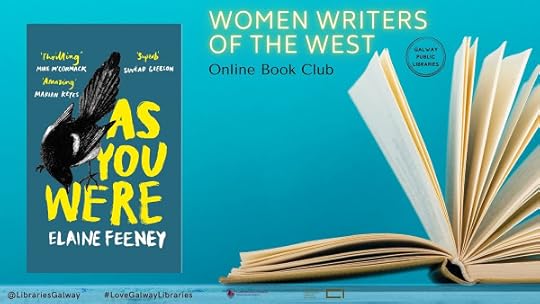

Published on February 22, 2021 04:05
February 5, 2021
Announcing the Women Writers of the West online book club - starting soon!
It gives me great pleasure to announce that the new online book club, 'Women Writers of the West,' organised by Galway Public Libraries with the support of Creative Ireland, will be kicking off in just under two weeks time, featuring three wonderful writers, Elaine Feeney, Mary Costello and Nuala O'Connor and facilitated by yours truly!
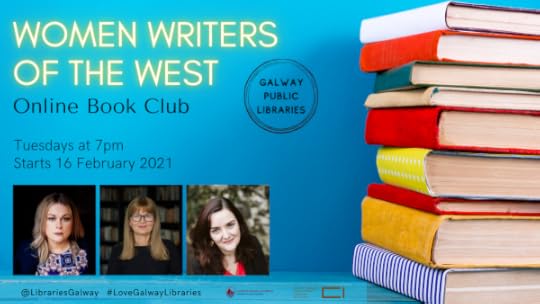 The 'Women Writers of the West' book club, which aims to shine a spotlight on the especially vibrant space of contemporary women’s writing in the West of Ireland, will feature special guest appearances each week from each of the authors during the second half of the book club sessions. Tickets are always free but places are limited and you can register for your spot by clicking on the event page below. We will be reading
As You Were
,
Academy Street
and
Becoming Belle
so don't hesitate to grab your copies now and get reading! Join us for another exciting voyage as we enter the diverse, vivid worlds of three memorable fictional characters: Sinéad Hynes, Tess Hilton and Isabel Bilton. The event page, with full information, is linked
here
.
The 'Women Writers of the West' book club, which aims to shine a spotlight on the especially vibrant space of contemporary women’s writing in the West of Ireland, will feature special guest appearances each week from each of the authors during the second half of the book club sessions. Tickets are always free but places are limited and you can register for your spot by clicking on the event page below. We will be reading
As You Were
,
Academy Street
and
Becoming Belle
so don't hesitate to grab your copies now and get reading! Join us for another exciting voyage as we enter the diverse, vivid worlds of three memorable fictional characters: Sinéad Hynes, Tess Hilton and Isabel Bilton. The event page, with full information, is linked
here
.
 The 'Women Writers of the West' book club, which aims to shine a spotlight on the especially vibrant space of contemporary women’s writing in the West of Ireland, will feature special guest appearances each week from each of the authors during the second half of the book club sessions. Tickets are always free but places are limited and you can register for your spot by clicking on the event page below. We will be reading
As You Were
,
Academy Street
and
Becoming Belle
so don't hesitate to grab your copies now and get reading! Join us for another exciting voyage as we enter the diverse, vivid worlds of three memorable fictional characters: Sinéad Hynes, Tess Hilton and Isabel Bilton. The event page, with full information, is linked
here
.
The 'Women Writers of the West' book club, which aims to shine a spotlight on the especially vibrant space of contemporary women’s writing in the West of Ireland, will feature special guest appearances each week from each of the authors during the second half of the book club sessions. Tickets are always free but places are limited and you can register for your spot by clicking on the event page below. We will be reading
As You Were
,
Academy Street
and
Becoming Belle
so don't hesitate to grab your copies now and get reading! Join us for another exciting voyage as we enter the diverse, vivid worlds of three memorable fictional characters: Sinéad Hynes, Tess Hilton and Isabel Bilton. The event page, with full information, is linked
here
.
Published on February 05, 2021 03:32
January 19, 2021
Reflection on the 'Journeys in Words' online bookclub
It’s a week since the 'Journeys in Words' online bookclub reached its final destination (ending last Tuesday night) and I’m still thinking about the two writers we explored and, specifically, about the animal world Liam O’Flaherty evokes so keenly. At the weekend, Kevin, myself and our two boys walked to Mutton Island for some fresh air and exercise. It was a cool, clear Saturday afternoon and, gazing at the ocean, I kept thinking of the conger eel’s struggle, firstly to placate his hunger by catching mackerel and secondly, to writhe free of the fishermens' net. In my mind’s eye, I could see that net lowering into the Atlantic and scaling it. This is surely the mark of a great writer; someone whose words stay with you, linger in your head, mingling vision and imagination with your present reality. A recent study, highlighted again in an article last week, has shown that crows are self-aware and I'm reminded of that seagull O'Flaherty poises on a ledge, goaded by his mother into finally taking his ‘first flight’. Jennifer Ackerman notes in
The Genius of Birds
, that our expression "bird brain" is long redundant. Both science and the stories of O'Flaherty remind us that we need to keep refreshing our knowledge about the animal kingdom lest we continue to underestimate our fellow earthly creatures.
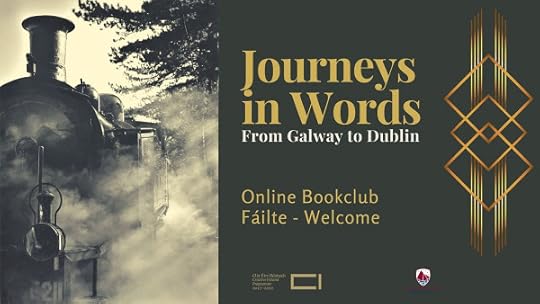 While the focus of our book club was the short story form, the late Eileen Battersby aptly reminded us that it "remains too easy to confine a reading of O'Flaherty's highly cinematic art to 150 often superb, short stories - many of them fables which present him as an intense primitive, preoccupied with the brutal inevitably of nature in its dealings with animal and man, while missing out on the political and socio-cultural dimension of his vision. O'Flaherty never forgot the landscape and lifestyle of his island home but, through his travels soon became quite cosmopolitan.” And we certainly broadened our bookclub discussions beyond O'Flaherty the naturalist to consider his nomadic spirit, his political activism (the 99th anniversary of his seizure of the Rotunda on 21 January, 1922 is just a few days away) and, more generally, his entire corpus – (O’Flaherty was remarkably prolific, producing a novel per year throughout the 1920s and into the 1930s).
While the focus of our book club was the short story form, the late Eileen Battersby aptly reminded us that it "remains too easy to confine a reading of O'Flaherty's highly cinematic art to 150 often superb, short stories - many of them fables which present him as an intense primitive, preoccupied with the brutal inevitably of nature in its dealings with animal and man, while missing out on the political and socio-cultural dimension of his vision. O'Flaherty never forgot the landscape and lifestyle of his island home but, through his travels soon became quite cosmopolitan.” And we certainly broadened our bookclub discussions beyond O'Flaherty the naturalist to consider his nomadic spirit, his political activism (the 99th anniversary of his seizure of the Rotunda on 21 January, 1922 is just a few days away) and, more generally, his entire corpus – (O’Flaherty was remarkably prolific, producing a novel per year throughout the 1920s and into the 1930s).
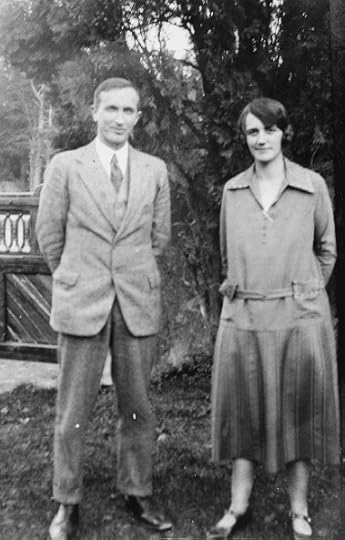 Having studied for the priesthood early in his life, he underwent a loss of religious certainties and ideological affiliation, and was faced with the necessity of dealing with these crises in his art. I’m struck by the fact that he was a man of action and rebel who travelled the world with an open mind, gradually losing faith in religion, communism and republicanism (roughly in that order) only to realise that what he truly wanted was to get back to that native ‘rock’ in his imagination, to that 'otherwhere' of oral storytelling which we glimpse in The Ecstacy of Angus. In the example of O’Flaherty – who was by no means a ‘saint’ – we can recognise that the journey of artistic integrity is not dictated by financial gain, a quest for fame or by what’s in vogue. Like Patrick Kavanagh, another Irish writer who protested the grand delusions of the Irish Literary Revival, and whose trajectory can be mapped in his early pastoral writings, his urban pieces, his disenchanted anti-pastoral writings (The Great Hunger) and, ultimately, his return to a celebration of the everyday in his canal bank poems, it is the honest seeker who doesn’t compromise to satisfy external tastes or stakeholders whose work will ultimately stand up to scrutiny because it is not a travesty; it derives from an authentic, questing humanity.
Having studied for the priesthood early in his life, he underwent a loss of religious certainties and ideological affiliation, and was faced with the necessity of dealing with these crises in his art. I’m struck by the fact that he was a man of action and rebel who travelled the world with an open mind, gradually losing faith in religion, communism and republicanism (roughly in that order) only to realise that what he truly wanted was to get back to that native ‘rock’ in his imagination, to that 'otherwhere' of oral storytelling which we glimpse in The Ecstacy of Angus. In the example of O’Flaherty – who was by no means a ‘saint’ – we can recognise that the journey of artistic integrity is not dictated by financial gain, a quest for fame or by what’s in vogue. Like Patrick Kavanagh, another Irish writer who protested the grand delusions of the Irish Literary Revival, and whose trajectory can be mapped in his early pastoral writings, his urban pieces, his disenchanted anti-pastoral writings (The Great Hunger) and, ultimately, his return to a celebration of the everyday in his canal bank poems, it is the honest seeker who doesn’t compromise to satisfy external tastes or stakeholders whose work will ultimately stand up to scrutiny because it is not a travesty; it derives from an authentic, questing humanity.
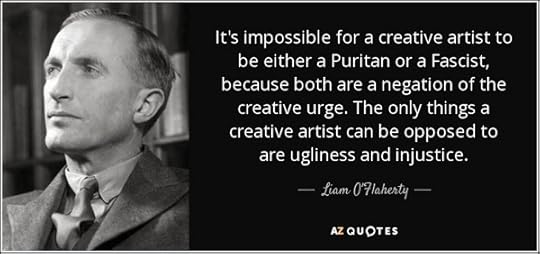 A famous quote of O’Flaherty’s that is all over the web and hints at the breadth of the man’s thinking can be read directly above. As well as suffering from the wrath of the censorship board, (he was one of the most censored writers in Ireland in the 1930s) O’Flaherty has, perhaps, also been unfairly disparaged by critics for his refusal to work within a completely realist mode in his novels. (He has been most widely praised for The Informer, Skerrett and Famine). I think this quotation hints at the expansiveness of his vision – something which has proven challenging for academics, who would too easily wish to pin down O’Flaherty and find that they cannot. As Dermot Heaney writes in his paper “The O’Flaherty Novel: a problem of critical approach”: “One cannot help feeling that many critics would prefer a lesser, more easily definable author, a tidier writer.” (1995, Etudes Irlandaises)
A famous quote of O’Flaherty’s that is all over the web and hints at the breadth of the man’s thinking can be read directly above. As well as suffering from the wrath of the censorship board, (he was one of the most censored writers in Ireland in the 1930s) O’Flaherty has, perhaps, also been unfairly disparaged by critics for his refusal to work within a completely realist mode in his novels. (He has been most widely praised for The Informer, Skerrett and Famine). I think this quotation hints at the expansiveness of his vision – something which has proven challenging for academics, who would too easily wish to pin down O’Flaherty and find that they cannot. As Dermot Heaney writes in his paper “The O’Flaherty Novel: a problem of critical approach”: “One cannot help feeling that many critics would prefer a lesser, more easily definable author, a tidier writer.” (1995, Etudes Irlandaises)
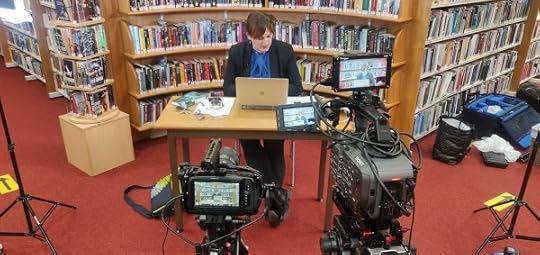 Unlike O’Flaherty, who deals with open expanses of nature and external turmoil,
Maeve Brennan
is a master of fraught interior spaces. In fact, the former externalises inner tumult in the great outdoors and the latter does something similar, but very much indoors, under a roof. Brennan’s detailed descriptions of confined domestic settings are often objective correlatives for the sense of claustrophobia her protagonists feel. A mixture of memoir and a study of two unhappy marriages, featuring the Derdons and the Bagots,
The Springs of Affection
has justly earned its classic status, finding republication in 2016 with Stinging Fly Press. Her attunement to the Ranelagh suburbs of the 1920s (her childhood home was at 48, Cherryfield Avenue) affords fascinating glimpses of the formation of the young writer’s mind and worldview and also of a unique and rarified era. Like Eilís Dillon, (the subject of our first book club at Galway Public Libraries during the month of October) Brennan was the child of Irish revolutionaries, Robert Brennan and Una Bolger. (Lucy McDiarmid has written a fascinating article that highlights the friendship between Dillon’s and Brennan’s parents). Domestic space plays a crucial role in these vignettes as her characters are increasingly marked by their perception of confinement.
Unlike O’Flaherty, who deals with open expanses of nature and external turmoil,
Maeve Brennan
is a master of fraught interior spaces. In fact, the former externalises inner tumult in the great outdoors and the latter does something similar, but very much indoors, under a roof. Brennan’s detailed descriptions of confined domestic settings are often objective correlatives for the sense of claustrophobia her protagonists feel. A mixture of memoir and a study of two unhappy marriages, featuring the Derdons and the Bagots,
The Springs of Affection
has justly earned its classic status, finding republication in 2016 with Stinging Fly Press. Her attunement to the Ranelagh suburbs of the 1920s (her childhood home was at 48, Cherryfield Avenue) affords fascinating glimpses of the formation of the young writer’s mind and worldview and also of a unique and rarified era. Like Eilís Dillon, (the subject of our first book club at Galway Public Libraries during the month of October) Brennan was the child of Irish revolutionaries, Robert Brennan and Una Bolger. (Lucy McDiarmid has written a fascinating article that highlights the friendship between Dillon’s and Brennan’s parents). Domestic space plays a crucial role in these vignettes as her characters are increasingly marked by their perception of confinement.
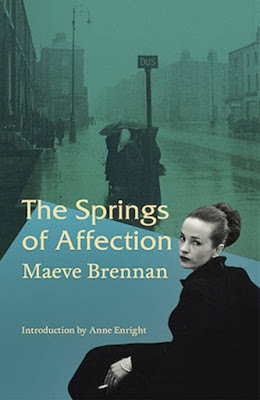 There’s a highly cinematic quality in Brennan’s story cycles too - like O’Flaherty, but in a different vocabulary – compounded by the fact that certain details are repeated & small narratives retold in sharper relief as the stories progress. Brennan can capture the minutiae of interior space exceedingly well. Indeed, a special kind of gift is required to find the narrative in ‘a panel of filigreed brass that runs all around the hearth’ (“The Sofa”) to isolate it and to say to the reader: ‘this, too, is important.’ It is true to say that the 'domestic,' as a subject for fiction, is often glossed over and subtly dismissed by critics. Maeve Brennan stunningly demonstrates, however, that this sphere is often the seat of our emotional and psychological well-being.
There’s a highly cinematic quality in Brennan’s story cycles too - like O’Flaherty, but in a different vocabulary – compounded by the fact that certain details are repeated & small narratives retold in sharper relief as the stories progress. Brennan can capture the minutiae of interior space exceedingly well. Indeed, a special kind of gift is required to find the narrative in ‘a panel of filigreed brass that runs all around the hearth’ (“The Sofa”) to isolate it and to say to the reader: ‘this, too, is important.’ It is true to say that the 'domestic,' as a subject for fiction, is often glossed over and subtly dismissed by critics. Maeve Brennan stunningly demonstrates, however, that this sphere is often the seat of our emotional and psychological well-being.
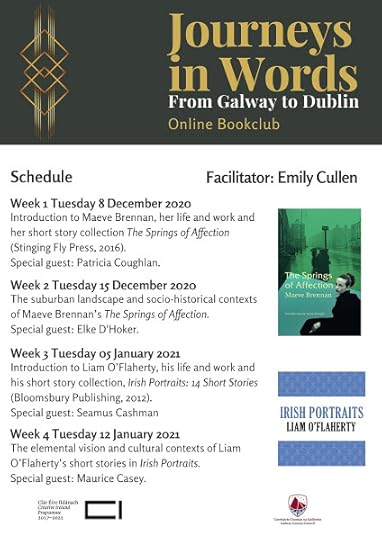 In terms of what these two writers, O’Flaherty and Brennan, might share in common: one could argue that they were both 'outsiders' – while enjoying ‘insider’ status for brief periods, especially in the case of Maeve Brennan who was very much what we might now term an ‘influencer’. To be a staff writer at The New Yorker during the 1950s and ‘60s was to occupy one of the most influential seats in American culture and Brennan contributed book reviews, fashion notes, essays, and short stories. Between 1954 and 1981 she wrote a series of sketches about daily life in Times Square and the Village for “The Talk of the Town.” But, as her biographer, Angela Bourke and others note, as an Irish-American woman at this period, Maeve was also very much an outsider.
In terms of what these two writers, O’Flaherty and Brennan, might share in common: one could argue that they were both 'outsiders' – while enjoying ‘insider’ status for brief periods, especially in the case of Maeve Brennan who was very much what we might now term an ‘influencer’. To be a staff writer at The New Yorker during the 1950s and ‘60s was to occupy one of the most influential seats in American culture and Brennan contributed book reviews, fashion notes, essays, and short stories. Between 1954 and 1981 she wrote a series of sketches about daily life in Times Square and the Village for “The Talk of the Town.” But, as her biographer, Angela Bourke and others note, as an Irish-American woman at this period, Maeve was also very much an outsider.
 Liam O’Flaherty retained, and perhaps basked in, his own outsider status during his life – and was also full of contradictions: an Irish republican who fought in World War I, a Gaeilgeoir from Inis Mór who spoke with a cut glass English accent, etc. In many ways he revelled in being a liminal figure and themes of alienation and loneliness loom large in his fiction. Both writers were perceptive observers of the society in which they lived and the contrasts between the polite society of suburban Ranelagh with the more rugged, elemental world conjured by O’Flaherty has made for a rewarding reading experience over the course of this book club. As noted above, both were from Republican backgrounds – O’Flaherty’s father was a Fenian - and both suffered from debilitating breakdowns at various points in their careers - more lastingly and, perhaps, tragically in Brennan's case. Arguably, both were reacting against romanticism in its many variants in their unique ways; O’Flaherty against the Literary Revivalist representation of the ‘perfect peasant’ and Brennan against the highly gendered Hollywood delusion of domestic bliss. Lastly, and in purely superficial terms, both writers were uncommonly good-looking and charismatic, and that is probably where the commonalities end and the rich contrasts take over. Juxtaposing two such varied voices made for a highly enjoyable reading experience with a piquant twist of the unpredictable. Taking this journey through words with two consummate masters of the short story form has been thrilling and I would like to sincerely thank our four guest speakers over the four sessions; experts on Brennan, O’Flaherty and the Irish short story form:
Prof. Patricia Coughlan
(UCC),
Prof. Elke D’hoker
(University of Leuven),
Seamus Cashman
(founder of Wolfhound Press) and
Dr. Maurice Casey
(historian at EPIC Museum). I also want to thank all of our participants – we had regular members in Dublin, Cork, Galway and even one member in Greece! It now gives me great pleasure to announce here that Galway Public Libraries and yours truly, with the support of Creative Ireland, will be bringing you another online book club soon – commencing in mid-February – and focusing this time, on contemporary Irish writers. More information to follow soon! Watch this space!
Liam O’Flaherty retained, and perhaps basked in, his own outsider status during his life – and was also full of contradictions: an Irish republican who fought in World War I, a Gaeilgeoir from Inis Mór who spoke with a cut glass English accent, etc. In many ways he revelled in being a liminal figure and themes of alienation and loneliness loom large in his fiction. Both writers were perceptive observers of the society in which they lived and the contrasts between the polite society of suburban Ranelagh with the more rugged, elemental world conjured by O’Flaherty has made for a rewarding reading experience over the course of this book club. As noted above, both were from Republican backgrounds – O’Flaherty’s father was a Fenian - and both suffered from debilitating breakdowns at various points in their careers - more lastingly and, perhaps, tragically in Brennan's case. Arguably, both were reacting against romanticism in its many variants in their unique ways; O’Flaherty against the Literary Revivalist representation of the ‘perfect peasant’ and Brennan against the highly gendered Hollywood delusion of domestic bliss. Lastly, and in purely superficial terms, both writers were uncommonly good-looking and charismatic, and that is probably where the commonalities end and the rich contrasts take over. Juxtaposing two such varied voices made for a highly enjoyable reading experience with a piquant twist of the unpredictable. Taking this journey through words with two consummate masters of the short story form has been thrilling and I would like to sincerely thank our four guest speakers over the four sessions; experts on Brennan, O’Flaherty and the Irish short story form:
Prof. Patricia Coughlan
(UCC),
Prof. Elke D’hoker
(University of Leuven),
Seamus Cashman
(founder of Wolfhound Press) and
Dr. Maurice Casey
(historian at EPIC Museum). I also want to thank all of our participants – we had regular members in Dublin, Cork, Galway and even one member in Greece! It now gives me great pleasure to announce here that Galway Public Libraries and yours truly, with the support of Creative Ireland, will be bringing you another online book club soon – commencing in mid-February – and focusing this time, on contemporary Irish writers. More information to follow soon! Watch this space!
 While the focus of our book club was the short story form, the late Eileen Battersby aptly reminded us that it "remains too easy to confine a reading of O'Flaherty's highly cinematic art to 150 often superb, short stories - many of them fables which present him as an intense primitive, preoccupied with the brutal inevitably of nature in its dealings with animal and man, while missing out on the political and socio-cultural dimension of his vision. O'Flaherty never forgot the landscape and lifestyle of his island home but, through his travels soon became quite cosmopolitan.” And we certainly broadened our bookclub discussions beyond O'Flaherty the naturalist to consider his nomadic spirit, his political activism (the 99th anniversary of his seizure of the Rotunda on 21 January, 1922 is just a few days away) and, more generally, his entire corpus – (O’Flaherty was remarkably prolific, producing a novel per year throughout the 1920s and into the 1930s).
While the focus of our book club was the short story form, the late Eileen Battersby aptly reminded us that it "remains too easy to confine a reading of O'Flaherty's highly cinematic art to 150 often superb, short stories - many of them fables which present him as an intense primitive, preoccupied with the brutal inevitably of nature in its dealings with animal and man, while missing out on the political and socio-cultural dimension of his vision. O'Flaherty never forgot the landscape and lifestyle of his island home but, through his travels soon became quite cosmopolitan.” And we certainly broadened our bookclub discussions beyond O'Flaherty the naturalist to consider his nomadic spirit, his political activism (the 99th anniversary of his seizure of the Rotunda on 21 January, 1922 is just a few days away) and, more generally, his entire corpus – (O’Flaherty was remarkably prolific, producing a novel per year throughout the 1920s and into the 1930s).
 Having studied for the priesthood early in his life, he underwent a loss of religious certainties and ideological affiliation, and was faced with the necessity of dealing with these crises in his art. I’m struck by the fact that he was a man of action and rebel who travelled the world with an open mind, gradually losing faith in religion, communism and republicanism (roughly in that order) only to realise that what he truly wanted was to get back to that native ‘rock’ in his imagination, to that 'otherwhere' of oral storytelling which we glimpse in The Ecstacy of Angus. In the example of O’Flaherty – who was by no means a ‘saint’ – we can recognise that the journey of artistic integrity is not dictated by financial gain, a quest for fame or by what’s in vogue. Like Patrick Kavanagh, another Irish writer who protested the grand delusions of the Irish Literary Revival, and whose trajectory can be mapped in his early pastoral writings, his urban pieces, his disenchanted anti-pastoral writings (The Great Hunger) and, ultimately, his return to a celebration of the everyday in his canal bank poems, it is the honest seeker who doesn’t compromise to satisfy external tastes or stakeholders whose work will ultimately stand up to scrutiny because it is not a travesty; it derives from an authentic, questing humanity.
Having studied for the priesthood early in his life, he underwent a loss of religious certainties and ideological affiliation, and was faced with the necessity of dealing with these crises in his art. I’m struck by the fact that he was a man of action and rebel who travelled the world with an open mind, gradually losing faith in religion, communism and republicanism (roughly in that order) only to realise that what he truly wanted was to get back to that native ‘rock’ in his imagination, to that 'otherwhere' of oral storytelling which we glimpse in The Ecstacy of Angus. In the example of O’Flaherty – who was by no means a ‘saint’ – we can recognise that the journey of artistic integrity is not dictated by financial gain, a quest for fame or by what’s in vogue. Like Patrick Kavanagh, another Irish writer who protested the grand delusions of the Irish Literary Revival, and whose trajectory can be mapped in his early pastoral writings, his urban pieces, his disenchanted anti-pastoral writings (The Great Hunger) and, ultimately, his return to a celebration of the everyday in his canal bank poems, it is the honest seeker who doesn’t compromise to satisfy external tastes or stakeholders whose work will ultimately stand up to scrutiny because it is not a travesty; it derives from an authentic, questing humanity.
 A famous quote of O’Flaherty’s that is all over the web and hints at the breadth of the man’s thinking can be read directly above. As well as suffering from the wrath of the censorship board, (he was one of the most censored writers in Ireland in the 1930s) O’Flaherty has, perhaps, also been unfairly disparaged by critics for his refusal to work within a completely realist mode in his novels. (He has been most widely praised for The Informer, Skerrett and Famine). I think this quotation hints at the expansiveness of his vision – something which has proven challenging for academics, who would too easily wish to pin down O’Flaherty and find that they cannot. As Dermot Heaney writes in his paper “The O’Flaherty Novel: a problem of critical approach”: “One cannot help feeling that many critics would prefer a lesser, more easily definable author, a tidier writer.” (1995, Etudes Irlandaises)
A famous quote of O’Flaherty’s that is all over the web and hints at the breadth of the man’s thinking can be read directly above. As well as suffering from the wrath of the censorship board, (he was one of the most censored writers in Ireland in the 1930s) O’Flaherty has, perhaps, also been unfairly disparaged by critics for his refusal to work within a completely realist mode in his novels. (He has been most widely praised for The Informer, Skerrett and Famine). I think this quotation hints at the expansiveness of his vision – something which has proven challenging for academics, who would too easily wish to pin down O’Flaherty and find that they cannot. As Dermot Heaney writes in his paper “The O’Flaherty Novel: a problem of critical approach”: “One cannot help feeling that many critics would prefer a lesser, more easily definable author, a tidier writer.” (1995, Etudes Irlandaises)
 Unlike O’Flaherty, who deals with open expanses of nature and external turmoil,
Maeve Brennan
is a master of fraught interior spaces. In fact, the former externalises inner tumult in the great outdoors and the latter does something similar, but very much indoors, under a roof. Brennan’s detailed descriptions of confined domestic settings are often objective correlatives for the sense of claustrophobia her protagonists feel. A mixture of memoir and a study of two unhappy marriages, featuring the Derdons and the Bagots,
The Springs of Affection
has justly earned its classic status, finding republication in 2016 with Stinging Fly Press. Her attunement to the Ranelagh suburbs of the 1920s (her childhood home was at 48, Cherryfield Avenue) affords fascinating glimpses of the formation of the young writer’s mind and worldview and also of a unique and rarified era. Like Eilís Dillon, (the subject of our first book club at Galway Public Libraries during the month of October) Brennan was the child of Irish revolutionaries, Robert Brennan and Una Bolger. (Lucy McDiarmid has written a fascinating article that highlights the friendship between Dillon’s and Brennan’s parents). Domestic space plays a crucial role in these vignettes as her characters are increasingly marked by their perception of confinement.
Unlike O’Flaherty, who deals with open expanses of nature and external turmoil,
Maeve Brennan
is a master of fraught interior spaces. In fact, the former externalises inner tumult in the great outdoors and the latter does something similar, but very much indoors, under a roof. Brennan’s detailed descriptions of confined domestic settings are often objective correlatives for the sense of claustrophobia her protagonists feel. A mixture of memoir and a study of two unhappy marriages, featuring the Derdons and the Bagots,
The Springs of Affection
has justly earned its classic status, finding republication in 2016 with Stinging Fly Press. Her attunement to the Ranelagh suburbs of the 1920s (her childhood home was at 48, Cherryfield Avenue) affords fascinating glimpses of the formation of the young writer’s mind and worldview and also of a unique and rarified era. Like Eilís Dillon, (the subject of our first book club at Galway Public Libraries during the month of October) Brennan was the child of Irish revolutionaries, Robert Brennan and Una Bolger. (Lucy McDiarmid has written a fascinating article that highlights the friendship between Dillon’s and Brennan’s parents). Domestic space plays a crucial role in these vignettes as her characters are increasingly marked by their perception of confinement.
 There’s a highly cinematic quality in Brennan’s story cycles too - like O’Flaherty, but in a different vocabulary – compounded by the fact that certain details are repeated & small narratives retold in sharper relief as the stories progress. Brennan can capture the minutiae of interior space exceedingly well. Indeed, a special kind of gift is required to find the narrative in ‘a panel of filigreed brass that runs all around the hearth’ (“The Sofa”) to isolate it and to say to the reader: ‘this, too, is important.’ It is true to say that the 'domestic,' as a subject for fiction, is often glossed over and subtly dismissed by critics. Maeve Brennan stunningly demonstrates, however, that this sphere is often the seat of our emotional and psychological well-being.
There’s a highly cinematic quality in Brennan’s story cycles too - like O’Flaherty, but in a different vocabulary – compounded by the fact that certain details are repeated & small narratives retold in sharper relief as the stories progress. Brennan can capture the minutiae of interior space exceedingly well. Indeed, a special kind of gift is required to find the narrative in ‘a panel of filigreed brass that runs all around the hearth’ (“The Sofa”) to isolate it and to say to the reader: ‘this, too, is important.’ It is true to say that the 'domestic,' as a subject for fiction, is often glossed over and subtly dismissed by critics. Maeve Brennan stunningly demonstrates, however, that this sphere is often the seat of our emotional and psychological well-being.
 In terms of what these two writers, O’Flaherty and Brennan, might share in common: one could argue that they were both 'outsiders' – while enjoying ‘insider’ status for brief periods, especially in the case of Maeve Brennan who was very much what we might now term an ‘influencer’. To be a staff writer at The New Yorker during the 1950s and ‘60s was to occupy one of the most influential seats in American culture and Brennan contributed book reviews, fashion notes, essays, and short stories. Between 1954 and 1981 she wrote a series of sketches about daily life in Times Square and the Village for “The Talk of the Town.” But, as her biographer, Angela Bourke and others note, as an Irish-American woman at this period, Maeve was also very much an outsider.
In terms of what these two writers, O’Flaherty and Brennan, might share in common: one could argue that they were both 'outsiders' – while enjoying ‘insider’ status for brief periods, especially in the case of Maeve Brennan who was very much what we might now term an ‘influencer’. To be a staff writer at The New Yorker during the 1950s and ‘60s was to occupy one of the most influential seats in American culture and Brennan contributed book reviews, fashion notes, essays, and short stories. Between 1954 and 1981 she wrote a series of sketches about daily life in Times Square and the Village for “The Talk of the Town.” But, as her biographer, Angela Bourke and others note, as an Irish-American woman at this period, Maeve was also very much an outsider.
 Liam O’Flaherty retained, and perhaps basked in, his own outsider status during his life – and was also full of contradictions: an Irish republican who fought in World War I, a Gaeilgeoir from Inis Mór who spoke with a cut glass English accent, etc. In many ways he revelled in being a liminal figure and themes of alienation and loneliness loom large in his fiction. Both writers were perceptive observers of the society in which they lived and the contrasts between the polite society of suburban Ranelagh with the more rugged, elemental world conjured by O’Flaherty has made for a rewarding reading experience over the course of this book club. As noted above, both were from Republican backgrounds – O’Flaherty’s father was a Fenian - and both suffered from debilitating breakdowns at various points in their careers - more lastingly and, perhaps, tragically in Brennan's case. Arguably, both were reacting against romanticism in its many variants in their unique ways; O’Flaherty against the Literary Revivalist representation of the ‘perfect peasant’ and Brennan against the highly gendered Hollywood delusion of domestic bliss. Lastly, and in purely superficial terms, both writers were uncommonly good-looking and charismatic, and that is probably where the commonalities end and the rich contrasts take over. Juxtaposing two such varied voices made for a highly enjoyable reading experience with a piquant twist of the unpredictable. Taking this journey through words with two consummate masters of the short story form has been thrilling and I would like to sincerely thank our four guest speakers over the four sessions; experts on Brennan, O’Flaherty and the Irish short story form:
Prof. Patricia Coughlan
(UCC),
Prof. Elke D’hoker
(University of Leuven),
Seamus Cashman
(founder of Wolfhound Press) and
Dr. Maurice Casey
(historian at EPIC Museum). I also want to thank all of our participants – we had regular members in Dublin, Cork, Galway and even one member in Greece! It now gives me great pleasure to announce here that Galway Public Libraries and yours truly, with the support of Creative Ireland, will be bringing you another online book club soon – commencing in mid-February – and focusing this time, on contemporary Irish writers. More information to follow soon! Watch this space!
Liam O’Flaherty retained, and perhaps basked in, his own outsider status during his life – and was also full of contradictions: an Irish republican who fought in World War I, a Gaeilgeoir from Inis Mór who spoke with a cut glass English accent, etc. In many ways he revelled in being a liminal figure and themes of alienation and loneliness loom large in his fiction. Both writers were perceptive observers of the society in which they lived and the contrasts between the polite society of suburban Ranelagh with the more rugged, elemental world conjured by O’Flaherty has made for a rewarding reading experience over the course of this book club. As noted above, both were from Republican backgrounds – O’Flaherty’s father was a Fenian - and both suffered from debilitating breakdowns at various points in their careers - more lastingly and, perhaps, tragically in Brennan's case. Arguably, both were reacting against romanticism in its many variants in their unique ways; O’Flaherty against the Literary Revivalist representation of the ‘perfect peasant’ and Brennan against the highly gendered Hollywood delusion of domestic bliss. Lastly, and in purely superficial terms, both writers were uncommonly good-looking and charismatic, and that is probably where the commonalities end and the rich contrasts take over. Juxtaposing two such varied voices made for a highly enjoyable reading experience with a piquant twist of the unpredictable. Taking this journey through words with two consummate masters of the short story form has been thrilling and I would like to sincerely thank our four guest speakers over the four sessions; experts on Brennan, O’Flaherty and the Irish short story form:
Prof. Patricia Coughlan
(UCC),
Prof. Elke D’hoker
(University of Leuven),
Seamus Cashman
(founder of Wolfhound Press) and
Dr. Maurice Casey
(historian at EPIC Museum). I also want to thank all of our participants – we had regular members in Dublin, Cork, Galway and even one member in Greece! It now gives me great pleasure to announce here that Galway Public Libraries and yours truly, with the support of Creative Ireland, will be bringing you another online book club soon – commencing in mid-February – and focusing this time, on contemporary Irish writers. More information to follow soon! Watch this space!
Published on January 19, 2021 15:59
January 8, 2021
New online course, The Craft of Poetry Writing, starting in February
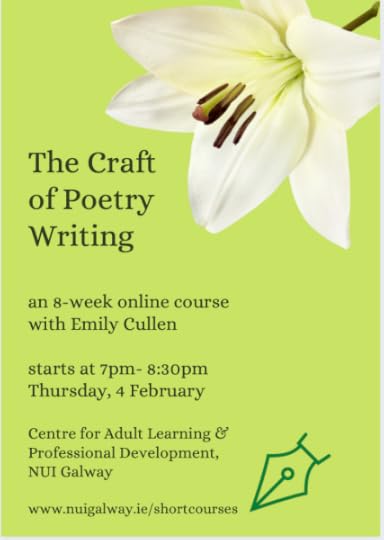 February is an opportune month to awaken the senses to new sights, sounds and possibilities for your poetry practice as we leave behind the dark days of Winter in the hope of brighter, breezier and indeed, safer times just around the corner. I’m delighted to announce that I will be teaching an 8-week online course, ‘The Craft of Poetry Writing’ for the Centre for Adult Learning and Professional Development at NUI Galway throughout February and March. The course will run on Thursday evenings from 7pm to 8:30pm beginning on Thursday, 4 February. Part lecture, part workshop, we will explore a different aspect of poetry and prosody each week with themes including: voice, ekphrasis, poetic forms, line breaks and revision, among others. You will receive valuable feedback on your poems in a safe and encouraging space, as well as plenty of creative prompts to inspire new work. The course is excellent value at just €100 and you will come away with some fresh insights and a range of newly composed pieces. For full details on ‘The Craft of Poetry Writing’ and for the link to the short online courses booket visit www.nuigalway.ie/shortcourses. Places are limited so don't hesitate to book your spot as soon as possible.
February is an opportune month to awaken the senses to new sights, sounds and possibilities for your poetry practice as we leave behind the dark days of Winter in the hope of brighter, breezier and indeed, safer times just around the corner. I’m delighted to announce that I will be teaching an 8-week online course, ‘The Craft of Poetry Writing’ for the Centre for Adult Learning and Professional Development at NUI Galway throughout February and March. The course will run on Thursday evenings from 7pm to 8:30pm beginning on Thursday, 4 February. Part lecture, part workshop, we will explore a different aspect of poetry and prosody each week with themes including: voice, ekphrasis, poetic forms, line breaks and revision, among others. You will receive valuable feedback on your poems in a safe and encouraging space, as well as plenty of creative prompts to inspire new work. The course is excellent value at just €100 and you will come away with some fresh insights and a range of newly composed pieces. For full details on ‘The Craft of Poetry Writing’ and for the link to the short online courses booket visit www.nuigalway.ie/shortcourses. Places are limited so don't hesitate to book your spot as soon as possible.
Published on January 08, 2021 09:35
January 2, 2021
Journeys in Words book club resumes - on the stories of Liam O'Flaherty
Inis Mór born writer, Liam O'Flaherty fascinates me. A man of action & rebel who travelled the world twice over, fought in WWI and on the Republican side in the Civil War, raised the red flag over the Rotunda, visited soviet Russia, produced nearly a novel per year during the 1920s and into the 1930s, ranged from romantic realist to caustic social satirist. His memoirs, especially Shame the Devil (1934), make for an electrifying read. He is truly one of our great Irish writers and I love that he and his work can't easily be 'pinned down' by the critical establishment. Over the next two Tuesdays I have the pleasure of exploring his short stories in the free online book club I'm facilitating for Galway Public Libraries,
Journeys in Words - From Galway to Dublin
, which resumes at 7pm on Tuesday, 5 January with our final session on Tuesday, 12 January. This Tuesday we will be joined by poet and publisher,
Seamus Cashman
who played an important role in the recovery of Liam's work in the 1970s and 80s at Wolfhound Press, and who was also the author's friend. There are still a few places left and this book club is for the general public - for everyone who likes reading. Click on
this link
to bag one of the few remaining places!


Published on January 02, 2021 11:27
December 1, 2020
New Online Book Club: Journeys in Words - From Galway to Dublin - starting Tuesday, 8 December
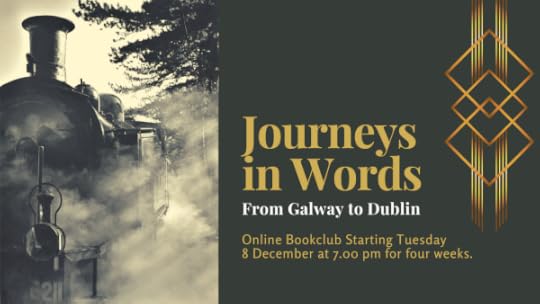 Following on from the highly successful Eilís Dillon Online Book Club, I'm delighted to let you know that I'm working with Galway Public Libraries on another exciting odyssey through words which focuses on two great Irish writers of the 20th c: Maeve Brennan and Liam O'Flaherty. During the 'Journeys in Words' book club we'll be traversing from East to West coast, from 1920s suburban Dublin to the rugged, elemental settings of Inis Mór. Fasten your seatbelt, grab your book, sit back and relax to join us for this journey! We will start by looking at Maeve Brennan's stories in The Springs of Affection (Stinging Fly Press, 2016) this month and continue with O'Flaherty's Irish Portraits: 14 Stories (Bloomsbury Publishing, 2012) after Christmas. Running for one hour, from 7pm - 8pm each session, our dates are: Tuesday, 8 Deecember Tuesday, 15 December, Tuesday, 5 January and Tuesday, 12 January 2021. Membership is always free but places are limited and tickets are available on a first-come-first-served basis. Click here to book your place! #galwaypubliclibraries #maevebrennan #liamoflaherty #greatirishwriters
Following on from the highly successful Eilís Dillon Online Book Club, I'm delighted to let you know that I'm working with Galway Public Libraries on another exciting odyssey through words which focuses on two great Irish writers of the 20th c: Maeve Brennan and Liam O'Flaherty. During the 'Journeys in Words' book club we'll be traversing from East to West coast, from 1920s suburban Dublin to the rugged, elemental settings of Inis Mór. Fasten your seatbelt, grab your book, sit back and relax to join us for this journey! We will start by looking at Maeve Brennan's stories in The Springs of Affection (Stinging Fly Press, 2016) this month and continue with O'Flaherty's Irish Portraits: 14 Stories (Bloomsbury Publishing, 2012) after Christmas. Running for one hour, from 7pm - 8pm each session, our dates are: Tuesday, 8 Deecember Tuesday, 15 December, Tuesday, 5 January and Tuesday, 12 January 2021. Membership is always free but places are limited and tickets are available on a first-come-first-served basis. Click here to book your place! #galwaypubliclibraries #maevebrennan #liamoflaherty #greatirishwriters
Published on December 01, 2020 08:25
November 26, 2020
Eilís Dillon Centenary Free Events Online - Politics & Patriotism seminar this evening
Despite all the challenges of 2020, Galway's own internationally acclaimed writer, Eilís Dillon (1920-1994) has been enjoying renewed appreciation and celebration in her centenary year. It has been a privilege to be part of some of the many events on her life and work that have taken place - some just before lockdown in early March - and others [fully socially distanced] since October and November. Galway Public Libraries have been busy commemorating Dillon and reappraising her legacy in a weekly book club during October (which I was honoured to facilitate), in education with the 5 Islands One Author project with Sadbh Devlin and also in three seminars exploring Dillon's times and writings around her politics and patriotism, historical fictions and detective novels (with special art and music commissions also ahead). The first of these seminars, Eilís Dillon: Politics & Patriotism, will be streamed online this evening at 7pm and features poet and Dillon's daughter, Eiléan Ní Chuilleanáin, Dr. Cathríona Clear and Honor O Brolchain, Dillon's niece and yours truly as convenor. Special musicians featured are Carmel Dempsey and Tomás Mannion. Visit the Galway Public Libraries YouTube channel and tune in to this unique event which integrates discussion with readings and music.
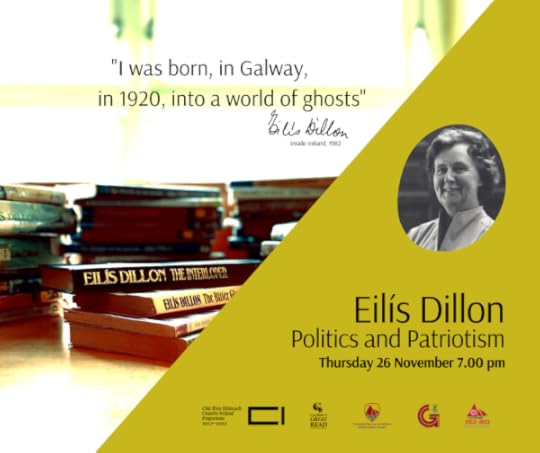
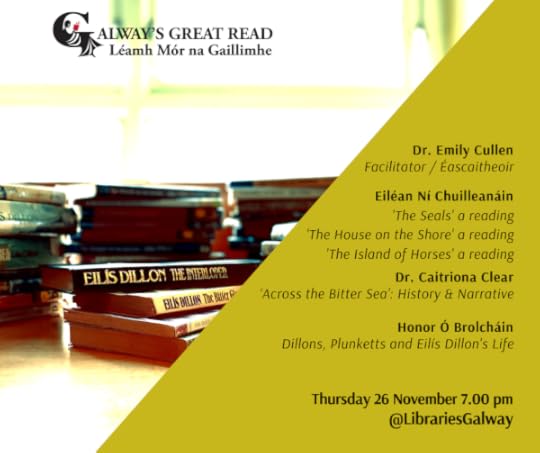


Published on November 26, 2020 03:57
November 3, 2020
Some recent projects and publications
“Music is colours and time in rhythm,” remarked
Claude Debussy
, memorably. One wonders if he was actually synaesthetic, ie. if he experienced sound as colour, or perhaps what he is referring to here are the tonal textures of music. Whatever his intention, Debussy is a fascinating composer, often credited with pioneering musical Impressionism, (though he had also some issues with that particular term) so I was thrilled to be invited by
Maeve Bryan
of
Galway Music Residency
to participate in their Creative Responses project. The task: to respond in poetry to Debussy’s String Quartet in G Minor, as performed by
ConTempo
- Galway’s wonderful quartet-in-residence. Composed when Debussy was just 31, this work in G Minor is his only string quartet, and what a dazzling opus it is. I'm always up for an ekphrastic challenge as well as the adventure of collaboration, (and have long admired and appreciated ConTempo's brilliant work) so this was an immensely enjoyable project to sink my teeth into. The only tricky part was grabbing a figurative bite to chew on since this piece dances, vacillates, heaves and swoons all over the place! Bursting with ingenuity, Debussy’s opening theme moves with a vibrant staccato swagger through various shades of interrogation, doubt, anger, whimsy, nostalgia and a final decisive resolution, that is utterly altered, but unequivocally firm. I tried, initally, to write a line-by-line rhetort to the changing moods of the piece, but eventually plumped for a different approach: to use one of the more curious lines that came up as a springboard for a poem that would also have a kind of syncopated sonority, oscillating in tone and movement. I corralled the following sentence to explore and unpack further and had plenty of fun along the way: “What would it look like if I were to modulate out of Mum into another mode?” The premise: a busy mother with a full morning of freedom ahead of her leaves the chores to one side and let her thoughts meander and feelings fulminate... So I ran with this and am pleased with the resulting poem, which is read beautifully by Maeve Bryan in the video clip below, with Debussy's composition following immediately after, along with many stunning visual responses to the music by a host of exciting artists from Galway and Mayo. I hope you enjoy it too! I’m delighted, also, to have a poem entitled “Time” in the current Autumn 2020 issue of Crannóg magazine. This Galway-based international publication has a special place in my heart and it’s great to learn that this edition - no. 53 - has already gone to a second printing. Their biggest issue yet, it features 45 poets and 9 fiction writers.
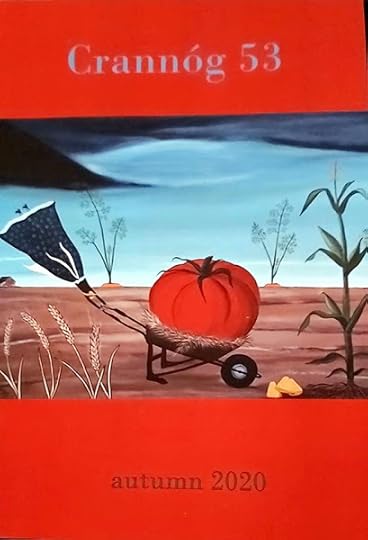 Because of the lockdown, there was no launch event for issue 53, but if you’d like to purchase a copy you can do so here. Below is my poem, “Time” which features in Crannog 53 and captures something of my ongoing turbulent relationship with the eponymous entity! I hope you like it.
Because of the lockdown, there was no launch event for issue 53, but if you’d like to purchase a copy you can do so here. Below is my poem, “Time” which features in Crannog 53 and captures something of my ongoing turbulent relationship with the eponymous entity! I hope you like it.
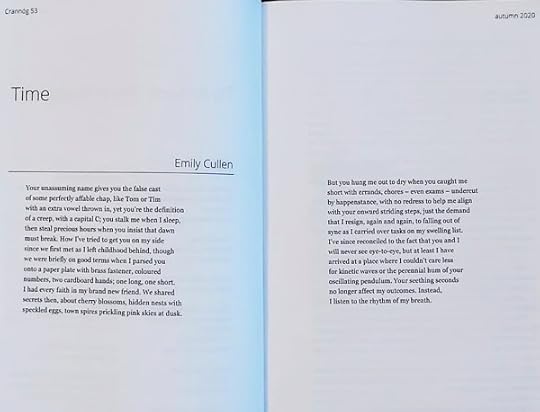
 Because of the lockdown, there was no launch event for issue 53, but if you’d like to purchase a copy you can do so here. Below is my poem, “Time” which features in Crannog 53 and captures something of my ongoing turbulent relationship with the eponymous entity! I hope you like it.
Because of the lockdown, there was no launch event for issue 53, but if you’d like to purchase a copy you can do so here. Below is my poem, “Time” which features in Crannog 53 and captures something of my ongoing turbulent relationship with the eponymous entity! I hope you like it.

Published on November 03, 2020 08:28
October 27, 2020
Online Poetry Courses starting soon ... book your place now
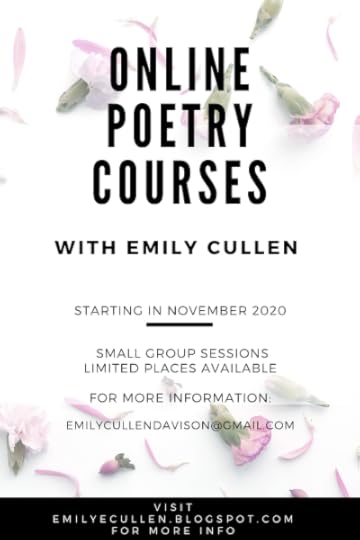 If Winter comes, can Spring be far behind…? Would you like to devote more time to your poetry practice over the coming Winter weeks? Want to immerse yourself in vivid, memorable poetry that works on a number of levels while composing new poems of your own and learning techniques and approaches to expand and sharpen your craft? I am delighted to announce that I will be running online poetry courses starting in early November and running for six weeks. I am keeping group sizes small to create and maintain a warm, supportive atmosphere and a safe space for creativity to flourish. I’m also keeping costs low because of these challenging pandemic times we are all living through. We will begin during the week beginning Monday, 2 November with limited spaces available. To find out more and book your place, please contact me now on: emilycullendavison@gmail.com.
If Winter comes, can Spring be far behind…? Would you like to devote more time to your poetry practice over the coming Winter weeks? Want to immerse yourself in vivid, memorable poetry that works on a number of levels while composing new poems of your own and learning techniques and approaches to expand and sharpen your craft? I am delighted to announce that I will be running online poetry courses starting in early November and running for six weeks. I am keeping group sizes small to create and maintain a warm, supportive atmosphere and a safe space for creativity to flourish. I’m also keeping costs low because of these challenging pandemic times we are all living through. We will begin during the week beginning Monday, 2 November with limited spaces available. To find out more and book your place, please contact me now on: emilycullendavison@gmail.com.
Published on October 27, 2020 06:34



